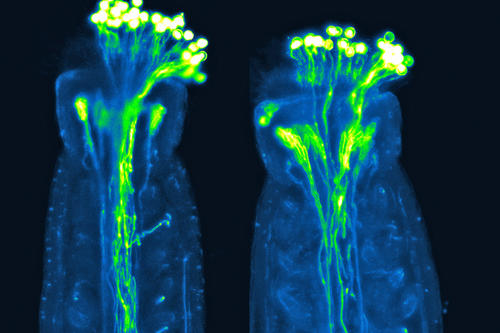Toxic or Beneficial?
Biologists have discovered why reputedly harmful radicals are important to plant fertilization
Mar 31, 2014
Scar in the carpel of the Arabidopsis thaliana plant: The pollen grains germinate and form pollen tubes. Fertilization takes place once the tubes reach the ovules. Without reactive oxygen species, the process is disrupted.
Image Credit: Roman Lassig
The role that reactive oxygen species play in sexual reproduction in plants has been discovered by researchers in the working group headed by biology professor Tina Romeis at the Dahlem Centre of Plant Sciences at Freie Universität Berlin, together with cooperation partners at the University of Würzburg and the University of Amsterdam.
Reactive oxygen species (ROS) do not have a particularly good reputation: They damage cells, make people look old, and can cause cancer. Larger amounts of these substances are harmful to plants, too. However, researchers now know that these radicals also help to defend against pathogens and play an important role in intercellular communication and the development of organs – in humans, animals, and plants.
The Biochemistry of Plants group headed by Professor Romeis at the Dahlem Centre of Plant Sciences (DCPS) has now discovered that the radicals are also crucial to sexual reproduction in plants. If the reactive oxygen species are missing during the fertilization phase, the pollen tube grows uncontrollably quickly and bursts before it can reach the ovule.
The Role of Radicals
Enzymes in the NAD(P)H oxidase family are the main things responsible for formation of reactive oxygen species. Two members of this family (RBOHH and RBOHJ) are found exclusively in plant pollen, where they are found in specific areas of the plasma membrane of the pollen tube. But what these radicals were doing there was unknown until the recent research.
Roman Lassig, a doctoral candidate in Romeis’s group, studied the subject in a project funded by the German Research Foundation (DFG), together with plant scientists at the University of Würzburg and the University of Amsterdam. Their findings were published in the prestigious scholarly publication The Plant Journal.
Results of Recent Research
In sexual reproduction in plants, pollen – the plant’s male sexual organ – forms a pollen tube after a flower has been pollinated. The sperm cells travel through this tube to the ovule, where fertilization takes place. A single flower is usually pollinated by thousands of individual grains of pollen. At that point, like in the animal kingdom, speed is key: The pollen tube that reaches an ovule first is the one that passes its genes along.
The formation of the pollen tube is a complex process, and how the various cellular processes work together is not yet understood in detail. For some years now, however, scientists have known that ROS are involved in development processes in plants, such as formation of root hairs.
Unchecked Growth Impetus Is Harmful
The team of researchers used microscopic and electrophysiological studies to show that the rate at which the pollen tube grows fluctuates to an extreme degree if no radicals are present. In some cases, the tube grows only a little, but then grows very rapidly, finally bursting in most cases. Video material illustrating this process is available on the DCPS website.
The researchers have concluded that in those plants that lack the enzymes to produce ROS in the pollen tube, cell expansion no longer proceeds in a coordinated way. The scientists suspect that ROS may contribute directly to stabilizing the cell envelope by linking the components of the cell wall together like a kind of mortar.
The Dose Alone Makes the Poison
Without ROS, the researchers say, the components would be only loosely arranged in the cell wall, so the cytoskeleton would remain soft in these areas, unable to withstand much cellular pressure. This allows the pollen tube to expand more quickly, but also makes it extremely unstable, according to the researchers. And that, they say, has fatal consequences for the pollen tube and the plant in the end: The cell wall surrounding the cell as a supporting structure becomes more and more fragile, the tube bursts, and the plant can no longer reproduce.
These research findings represent an important contribution to understanding the complex processes and feedback loops involved in plant reproduction – and they also illustrate that even reputedly harmful substances can be involved in fundamental processes such as reproduction. As is so often the case in nature – and as Paracelsus famously observed – “the dose alone makes the poison.”
Further Information
Prof. Dr. Tina Romeis, Institute of Biology and DCPS - Dahlem Center of Plant Sciences, Tel.: +49 30 838 53123, Email: tina.romeis@fu-berlin.de

